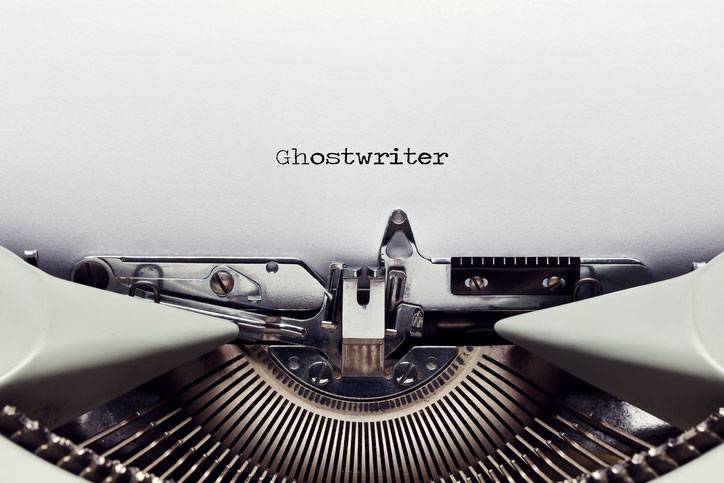Written by Catherine Dorian

Ghostwriting is what it sounds like – authoring a piece of work on behalf of someone else, taking no credit for it, and remaining invisible to the reading audience. Ghostwriters create content with the agreement that the client who hires them – politician, celebrity, researcher, scientist – will publish the work under their own name and present it as their own original work. With the exception of the parties involved in the transaction, as far as the world is concerned, the content was written by the person whose name appears on the byline.
Not all writers like being in the limelight. Given that our craft warrants solitude, many of us would rather simply do the work than be represented by it.
Ghostwriters have endless possibilities. We can contribute to any platform, write about different industries, explore new topics, and collaborate with writers with diverse perspectives from anywhere in the world.
Some writers just want to practice the craft. They don’t want to become public figures, and they don’t want to brand themselves as authors. Some public figures have something important to say but don’t have the mastery of the written word to do justice to their message or the story they want to tell.
Enter ghostwriting.
Ghostwriting allows you to conceal yourself behind the craft. It lets you hone the art of stepping into someone else’s shoes, assuming their voice, point of view, and style. Ghostwriting also allows the humble writer to give their clients an immeasurable gift: the gift of self-expression.
Who are Ghostwriters? … The Specter of the Invisible Contributor
 Contributed by Haley Boyce
Contributed by Haley Boyce
Ghostwriters are (living) people who are hired to write a book that has someone else as the named author. They get the work done without being seen by the public — like a ghost. Ghostwriting is a practice that used to come with a stigma but has gained more respect in recent years, even going so far as to refer to the practice as collaboration instead of ghostwriting.
There doesn’t seem to be a wealth of information about ghostwriting, which isn’t too shocking considering its particular purpose. However, according to Kelly James-Enger, author of the second edition of Goodbye Byline, Hello Big Bucks: Make Money Ghostwriting Books, Articles, Blogs and More, skills needed to be a ghostwriter are: confidence, creativity, flexibility, organization, and knowledge of publishing. And Publishers Weekly calls the best ghostwriters, or collaborators, “equal parts editor, reporter, writer, mimic, and shrink.
While writing a book, ghostwriters will meet with the person who will be named as the author to discuss their vision for the book. The two must be in agreement about the direction of the book, as one half of the team is writing it while the other half will be promoting it once it’s complete. Additionally, the named author will give the ghostwriter detailed notes, diaries, or other pertinent information that contributes to the story. Despite the book being created by two different people, it should come across seamlessly, with no reader being able to decipher the named author’s voice from that of the ghostwriter.
Not all ghostwritten books are created equal. While it is true that a great many of celebrity memoirs can be attributed to secret wordsmiths, other genres have been known to be visited by writing spirits as well. Here are some well-known books written by ghostwriters, and a few that might give you a shock.
- Open: An Autobiography, Andre Agassi
- Inside Out: A Memoir, Demi Moore
- The Secrets of My Life, Caitlyn Jenner
- Dragon Teeth, Michael Crichton
Dragon Teeth was discovered among Crichton’s files after his death in 2008. His publisher, Harper-Collins, hired a writer to use the wealth of notes in conjunction with what work Crichton had already penned for the book prior to passing.
Though unconfirmed by the authors or ghostwriters themselves, it is extensively rumored that the following authors had ghostwriters to keep up with high demand (fair warning that some of these might make your inner child cry):
- R.L. Stine, the Goosebumps series
- Ian Fleming, the James Bond series
- James Patterson, who in fact confessed in a Washington Post article that he conceptualizes the book then provides outlines and copious notes to co-authors (ghostwriters) who then write the novel from cover to cover.
- Tom Clancy, who is said to have written the majority of his novels until 2010 when Mark Greaney and Grant Blackwood joined him as co-authors.
- Ann M. Martin, the Babysitters Club series (Are you crying now?)
- Francine Pascal, the Sweet Valley High series (Your whole childhood wasn’t a lie, we promise.)
From Research Papers to Memoirs – Ghostwriting Isn’t Just Reserved for Fiction
 There are many kinds of ghostwriting. You could write nonfiction books or articles from the points of view of policymakers and politicians on diverse topics like immigration, the opioid crisis, environmental issues, and education.
There are many kinds of ghostwriting. You could write nonfiction books or articles from the points of view of policymakers and politicians on diverse topics like immigration, the opioid crisis, environmental issues, and education.
You could find yourself representing a group of research professors eager to share their findings with the public, with students, and with other academics, but lacking the skills to do so in a way that’s accessible.
Ghostwriters also take on work for people whose careers would benefit from a writing credit and the self-promotion of post-publication press junkets, but who can’t seem to find the time between spa days, photo shoots, and rehab to do the writing themselves.
For many celebrities, writing a memoir is a smart public relations move and a personal passion project, but one they just can’t make the time for. And without the chops to sit down and engage with the writing anyway, they’re more likely to hire someone else to organize their ideas and write the story they want to tell. Athletes are in the same boat. If you’re fascinated by an Olympian’s dedication and grit and your writing style matches their personality, and you have the right contacts, you could get the call to ghostwrite their memoir.
Many politicians, journalists, doctors, and influencers also hire ghostwriters for shorter pieces. You can write blogs on behalf of a fashion designer. If you’re familiar enough with the jargon, you can even write for medical journals or universities.
A journalist may be responsible for the ten-page spread about the Ukranian refugee crisis in Poland – but they may be so consumed with conducting interviews, checking facts, and building the story that they hire a trusted ghostwriter to put it all together.
Ghostwriting can also be your way of stepping into activism without actually having to step into the limelight. It’s widely known that most politicians don’t write their own speeches – they hire speech writers to do it for them. You don’t have to be the face behind a movement; you can ghostwrite work that reaches and influences a wide audience.
Once you start ghostwriting, you’ll only find more possibilities and opportunities to write on behalf of someone else – and to do what you love, without having to be in the spotlight.
How to Become a Ghostwriter
 There’s no perfect blueprint for the writing life. Some get into ghostwriting by design. They recognized that they loved to write and while they knew they wanted to write their own work, they also learned that they could earn money and contribute to important projects by writing on behalf of others. For some writers, ghostwriting becomes a kind of game for exercising their talent.
There’s no perfect blueprint for the writing life. Some get into ghostwriting by design. They recognized that they loved to write and while they knew they wanted to write their own work, they also learned that they could earn money and contribute to important projects by writing on behalf of others. For some writers, ghostwriting becomes a kind of game for exercising their talent.
Other ghostwriters almost stumble into the craft. They put their own work out there and someone else notices their distinct style, content-area knowledge, or their work’s marketability. They’re skilled at tuning into what people are thinking and capturing the zeitgeist of what they have to say. And so, political PR firms, executives, celebrities, and even academics eagerly recruit them to author an article or section of a book on their behalf.
Either way, there are a few things that you can do to make ghostwriting your full-time gig.
Step 1. Take Creative Writing Classes or Enroll in a Creative Writing Program
Writers who also write about the craft of writing, like Stephen King, Anne Lamott, Natalie Goldberg, and Phillip Lopate, will all tell you the same thing: Writers write. And when they’re not writing they’re reading. There’s no other way to get better.
You don’t need to go to school to become a writer; doing the thing and doing it consistently – even obsessively – is the only reliable way to develop your craft. But many of these writers will also tell you that finding a community of writers who can critique your work, give you feedback, and challenge you, will be essential to the development of your craft.
Taking creative writing courses will connect you with a community of fellow writers, all of whom are looking to grow and develop. Many programs operate in the workshop model, which will require that you submit work to your classmates, and in time, learn to take criticism better than you take compliments. You’ll use the feedback to rewrite and revise, which will build your endurance – and help you develop the growth mindset that you will surely need when you ghostwrite for someone else.
 Engaging in writing workshops, particularly in a university setting, will also teach you how to “read like a writer,” to credit Francine Prose. Since you’ll critique the work of your classmates, you’ll build the muscle that allows you to scrutinize and tighten your own work, when it comes time for you to work as a freelancer in ghostwriting.
Engaging in writing workshops, particularly in a university setting, will also teach you how to “read like a writer,” to credit Francine Prose. Since you’ll critique the work of your classmates, you’ll build the muscle that allows you to scrutinize and tighten your own work, when it comes time for you to work as a freelancer in ghostwriting.
Creative writing programs are the gateway to building a community of fellow writers. But they’re also academically rigorous spaces where you’ll learn the nuances of technique. How do you create accurate, but readable dialogue in a memoir or work of nonfiction? … How do you hone your style and voice so that it remains consistent throughout your piece? … How do you create variety in your sentence structure, so that your writing appeals to readers? … Where do you start the plot-driven piece, and how do you keep the readers’ attention throughout, without cutting corners?
You’ll practice these techniques consistently, so that when you go out on your own as a ghostwriter, you’ll have the confidence to meet the demands of your clients.
Step 2. Use your Network to Get Your First Gigs as a Ghostwriter
So many people want to write, but don’t have the time, confidence, or talent to do so. Think about who you know and how you could gift your skill to them.
Start small. Do you know someone who works in the health and wellness industry and wants to start a blog about what they know? Offer to pick their brain and write a few sample paragraphs on their behalf, paying attention to their voice and style of speaking so that you sound like they would … Do you know a teacher who has ideas for educational reform, but doesn’t feel confident in their ability to put the ideas into words? Take them out to coffee, ask to record their ideas, and offer to author an article under their name, which they can submit to a journal about education … Are you looking to get involved in local politics? … Attend a few campaign events and ask your preferred candidate if they write their own speeches and social media content. More than likely, they do, and more than likely, they’re getting busier and would be willing to outsource some of that work to a talented volunteer like you.
Writing for people that you know will help you build a portfolio of work. Though you can’t market the published piece as your own – that wouldn’t be ghostwriting, after all – you can, with their permission, share that you’ve done some ghostwriting for them.
Lots of people look for ghostwriters and ask their fellow professionals for referrals. If your first clients are impressed with your work and feel fulfilled by the work that you’ve done for them, they’ll be glad to refer their colleagues to you for your services.
Step 3. Be a Listener and Learn the Lingo
As a ghostwriter, you may write about topics that you don’t initially know much about. It’s not always as simple as doing your own research; you could be writing on behalf of some influential players in their respective fields, so you need to speak the language too.
You’ll have to become skilled at interviewing clients, absorbing their way of speaking, learning their lexicon, and channeling their personal style into your writing.
You may have no experience researching the long-term health risks of adolescent screen time; you may not have any direct experience sitting in the Situation Room with a former president. But if you’re the ghostwriter hired to do the job, you’ll be responsible for capturing the information and experiences with all the nuance and authenticity of a seasoned vet. So authentically, that everyone believes that the name on the byline is actually the person who wrote it.
Step 4. Be Dynamic
Especially when you first start your career in ghostwriting, you’ll write smaller pieces like articles for academic journals, blog posts, or informational content for niche-interest websites and professional associations. You’ll have to have some genuine curiosity about the topic you’re exploring. You’ll have to learn about industries, professions, and topics that you may have never considered before.
Get comfortable interviewing people. Read a variety of books across industries. Read plenty of memoirs and works of nonfiction from people of diverse backgrounds. Become someone who can adapt to any writing assignment the job demands.
Step 5. Create Your Niche as a Ghostwriter
While you’ll want to be open to the many available opportunities, you may also be coming into ghostwriting as a second career or side hustle. Think about what topics you already have knowledge in and how you could start ghostwriting for professionals in those communities. Are you a teacher transitioning out of the classroom? Get a job ghostwriting research articles for an Education Department at a university. Are you a registered nurse who also loves to write? Consider writing on behalf of people who work in medicine.
Once you gain some experience ghostwriting, you may find that your style is particularly well-suited to one industry or purpose. You may find that you’re successful at stepping into the point of view and voice of an athlete. After you ghostwrite a book for a pro, you may get to ghostwrite speeches for them, and they’ll become one of your consistent clients. You may find that your personality gels with high-powered executives; you can take on long-term projects ghostwriting for them.
Once you’ve made this your full-time gig, you’ll be able to be selective about which jobs you take and which ones you don’t, which will only make the job more fulfilling.
Step 6. Keep Honing Your Craft
 We’ve already talked about taking creative writing classes. But I want to stress that even if you’ve earned a bachelor’s in creative writing or a related field, you’ll only continue to polish your craft when you continue to engage with a community of writers. And being familiar with the workshop experience puts you in a good position to continue to improve your craft even after you graduate.
We’ve already talked about taking creative writing classes. But I want to stress that even if you’ve earned a bachelor’s in creative writing or a related field, you’ll only continue to polish your craft when you continue to engage with a community of writers. And being familiar with the workshop experience puts you in a good position to continue to improve your craft even after you graduate.
Enrolling in an MFA (Master of Fine Arts) in creative writing or similar graduate program will push you to try new techniques, which you can apply to your work as a ghostwriter. Your classmates will write in genres and styles that are different than yours, but they can certainly inspire your work to take a new direction.
Getting an MFA in Creative Writing or doing a writer’s residency is also one of the best ways to stay connected in a community of writers. As a ghostwriter, you will often collaborate with others, but you will also spend a lot of time practicing writing in isolation. Taking classes can bring perspective to your job and open the door to collaborating with others.
Graduate level writing courses will also allow you to push your comfort zone into more genres. If you’re getting bored with the same old thing, you can explore playwriting or screenwriting. Take classes specifically geared toward creative nonfiction or memoir and make yourself more marketable to influencers and professionals who need a ghostwriter to tell their story.
Where to Find Ghostwriting Jobs
We talked a bit about using your network to find your first few jobs. Since working as a writer often means freelancing and working remotely, you’ll want to continue thinking about how you can continue to use your network to keep finding opportunities.
To be clear: I’m not saying that you must build an entire social media platform dedicated to advertising your services as a ghostwriter. That would only take away some of the sweet anonymity that ghostwriters enjoy. However, you may consider how you can use sites like LinkedIn or Instagram to connect with professionals who need ghostwriters or fellow ghostwriters who are looking for someone to join their team. Add your #ghostwriting skills to your profile, and more opportunities will pop up on your feed.
A quick search for ghostwriting jobs on a platform like Indeed, LinkedIn Jobs, or ZipRecruiter can also generate some impressive leads. Companies like Scribe Media hire ghostwriters for book publishing projects, and there are other online platforms that can help connect you with freelance ghostwriting work. Find those platforms and consider making a profile; they can match you with clients and jobs so that you can make ghostwriting your full-time gig and main source of income.
How Much Do Ghostwriters Make?
According to the US Bureau of Labor Statistics, writers and authors make just under $35 an hour, or somewhere around $65,000 a year, which can be a comfortable income in some areas of the country. Of course, there’s a lot of variability in that number, depending on how consistent you are. Since you’re freelancing, you can pick and choose which jobs you take and curate your own work schedule, taking on more or less work depending on the time of year and projects that you’re working on.
If you’re ghostwriting book-length pieces, you may be paid a per-project rate. $15,000 for a 60,000-word manuscript seems to be standard, though you may be able to charge more or command less depending on the demands of the work.
For instance, someone writing a memoir may have written portions of the piece on their own, and you may be tasked with creating the structure and refining specific areas of the prose. On the other hand, you could be authoring an entire book about leadership in a particular industry; if you’re completing the project for a high-profile person in the field with a book contract, you may be able to charge more.
Why Become a Ghostwriter?
 Ghostwriting isn’t for those seeking name and fame. You cannot add what you ghostwrote to your personal portfolio or link it on your #authorgram. That would defeat the purpose. But that’s the whole point – and the fun – of ghostwriting. It’s the ultimate practice in voice. It’s the panacea for the writer’s ultimate anguish: how do I write work that impacts the world, without having to reveal myself to the world?
Ghostwriting isn’t for those seeking name and fame. You cannot add what you ghostwrote to your personal portfolio or link it on your #authorgram. That would defeat the purpose. But that’s the whole point – and the fun – of ghostwriting. It’s the ultimate practice in voice. It’s the panacea for the writer’s ultimate anguish: how do I write work that impacts the world, without having to reveal myself to the world?
Becoming a ghostwriter will not make you a celebrated writer. But it will allow you the opportunity to share your gift with the world, and to give that gift to someone else who wants to tell their story.
2021 US Bureau of Labor Statistics salary figures and job market trends for Writers and Authors reflect national data, not school-specific information. Conditions in your area may vary. Data accessed September 2022.




